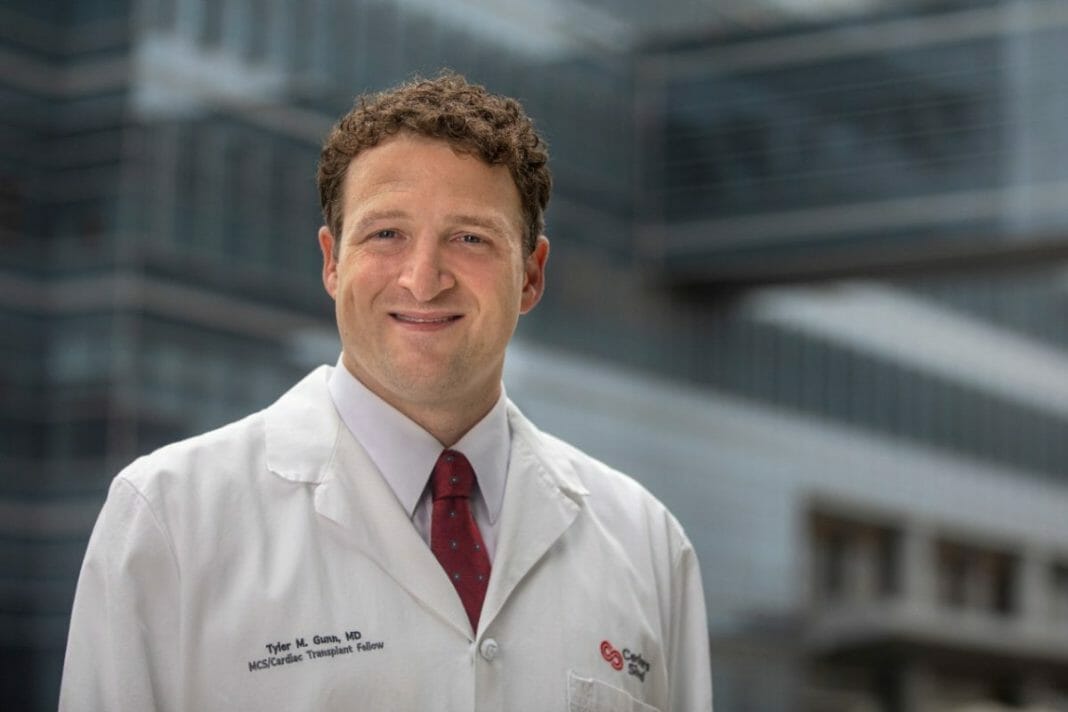The Smidt Heart Institute at Cedars-Sinai has selected board-certified cardiothoracic surgeon Tyler Gunn, MD, to be the director of the Extracorporeal Membrane Oxygenation, or ECMO, Program in the Department of Cardiac Surgery.
Gunn, who was both a resident and fellow during the COVID-19 pandemic, says his time spent on the medical front lines fueled his passion for treating patients on ECMO.
When ECMO is used, blood is pumped outside of the body to a portable heart-lung machine. The machine removes carbon dioxide from the blood, then sends oxygen-rich blood back into the body. In the past, this process was often considered a Hail Mary pass appropriate only for patients for whom all other therapies failed. During the global pandemic, however, ECMO proved increasingly successful in saving-and extending-lives.
“In my last year of surgical residency, I worked in a hospital where most of the patients we treated were unvaccinated against COVID-19 and many of them required ECMO for survival,” said Gunn. “I learned alongside my mentor, who happened to be a co-inventor of ECMO, which further fueled my understanding and interest in its use.”
An Iowa native, Gunn earned his bachelor’s degree in chemical engineering and his medical degree from the University of Iowa. He completed his surgical residency at the University of Kentucky.
Gunn then spent his fellowship year at the Smidt Heart Institute, training alongside some of the most respected experts in cardiothoracic transplant surgery and ECMO. It was during this time that Smidt Heart Institute experts reported that in carefully selected COVID-19 patients, ECMO could be a successful therapy as a bridge to lung transplantation, or to allow a patient’s own lungs to heal.
Joanna Chikwe, MD, founding chair of the Department of Cardiac Surgery in the Smidt Heart Institute at Cedars-Sinai, the Irina and George Schaeffer Distinguished Chair in Cardiac Surgery, served as corresponding author of the novel clinical data that supported wider use of ECMO. The data was published via an analysis in The New England Journal of Medicine.
The analysis included more than 3,000 lung transplantations that took place in the U.S. between Aug. 1, 2020, and Sept. 30, 2021. Smidt Heart Institute researchers showed that during the pandemic, 7% of the nation’s lung transplants were performed to treat severe, irreversible lung damage caused by COVID-19. More than half of these patients needed either ventilators or ECMO before their transplant.
“The ways in which we utilize ECMO today are vastly different than two years ago,” said Chikwe. “We have a real opportunity to continue pushing the boundaries and to solidify new ways we utilize-and study-ECMO in the academic medical center setting.”
Chikwe says these new opportunities are best for Gunn, whose excellence and eagerness will continue to propel the paradigm shift in the use of ECMO.
“Not only can we count on him to save lives as a surgeon,” Chikwe said, “but we know he will build upon and advance our ECMO program, ultimately benefiting the many patients who rely on this lifesaving intervention.”

